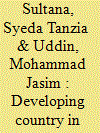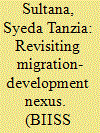|
|
|
Sort Order |
|
|
|
Items / Page
|
|
|
|
|
|
|
| Srl | Item |
| 1 |
ID:
167804


|
|
|
|
|
| Summary/Abstract |
Since the end of World War II, Bretton Woods system remains in the midst of Global Economic Governance (GEG). International Monetary Fund (IMF) was created to regulate monetary policy, International Bank for Reconstruction and Development (IBRD), then World Bank (WB) was formed to look into financial aid and lending, and General Agreement on Tariffs and Trade (GATT), then World Trade Organization (WTO) was established to regulate trade. These institutions are yet to provide much space for effective participation of developing states and are dominated by developed world like United States (US), European Union (EU), etc. Hence, a vital target of Goal 16 of Sustainable Development Goals (SDGs) is to broaden and strengthen the participation of developing states in global governance institutions. Global financial crisis and economic rise of China and India have resulted in large-scale participation of developing states in global economic governance. Being a developing country, Bangladesh will be benefitted and able to broaden its participation from exercising practices of China and India in the institutions of global economic governance.
|
|
|
|
|
|
|
|
|
|
|
|
|
|
|
|
| 2 |
ID:
161960


|
|
|
| 3 |
ID:
169580


|
|
|
|
|
| Summary/Abstract |
Migration has been intimately linked with development throughout history. International labour migration has contributed to enrich societies and economies of both countries of origin and destination. The academic discussion on the impact of migration on development has varied from time to time. Consequently, literature on migration-development nexus can be classified into three phases. Chronologically, from 1950 to 1960s, scholars viewed migration as beneficial to development. From 1970 to 1980s, literature considered migration to contribute to poverty and underdevelopment in the country of origin. Since 1990s, migration has been seen as a facilitator to development. In effect, to assess the influence of migration on development, existing literature in these phases tends to focus only on economic indicators, e.g., poverty reduction, national income and GDP growth rate, etc. of development. However, the development paradigm since the 1980s focuses on human indicators, e.g., freedom, choice, opportunity and capability of development. It argues that obsession with economic growth and creation of wealth denies the fact that development is ultimately about people. In this respect, the existing literature on migrationdevelopment nexus not only ignores the human face of development but also pushes people from centre to periphery of development. In this context, the paper comes up with an alternative framework to understand the migration-development nexus. It also argues that by creating opportunities, building capabilities and enlarging choices, international labour migration influences development of the origin country at the micro (household) level. Based on these arguments, to revisit migration-development nexus, the paper takes account of successful international labour migrants’ household in Dhaka city of Bangladesh as a case study.
|
|
|
|
|
|
|
|
|
|
|
|
|
|
|
|
|
|
|
|
|